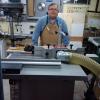Hello all, I am thinking about some tools that are fairly new, within the last 30 years, that have been used in a commercial setting, but most have 3 phase.
I happen to have one 2 hp motor 1 phase sitting around from a dust collector that I dismantled and I am thinking it would work well on an 8" jointer, or perhaps a 20" bandsaw?
I just wondered if there are problems swapping motors? Are there problems with the motor mounts and the holes not aligning properly? Do you have to get new motor mounts?
Needless to say some of these machines are way less expensive than new, or ebay, or craigslist...
Thanks for any insight...




 Reply With Quote
Reply With Quote


 I had to laugh about the internet and a reference to "younger" folks... hahaha.... I also (at 57) very much appreciate, no, revel, in how wonderful it is to find information... of course... there is also a lot of mis-information that must be sifted through. The loudest voice is not necessarily the most accurate.
I had to laugh about the internet and a reference to "younger" folks... hahaha.... I also (at 57) very much appreciate, no, revel, in how wonderful it is to find information... of course... there is also a lot of mis-information that must be sifted through. The loudest voice is not necessarily the most accurate. 

